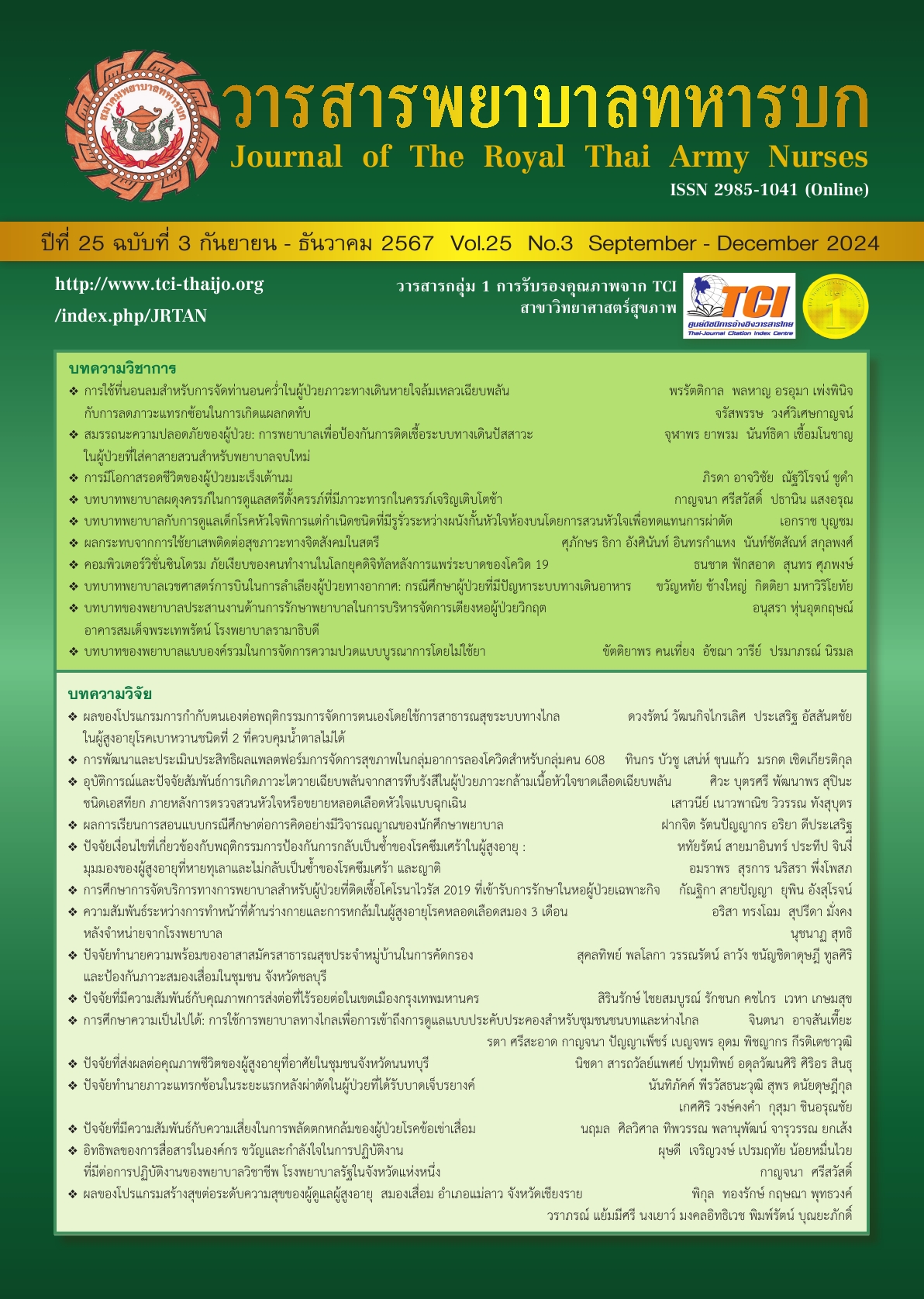Conditional Factors Associated with Behaviors for Preventing Relapse of Major Depressive Disorder in The Older Persons: Perspectives of Older Persons who had Remission and Non-Relapsed of Major Depressive Disorders and Their Relatives
Keywords:
self-efficacy for coping with depression, stressful life events, expressed emotion of family members, supportive factors and obstacles, behaviors for preventing relapse, major depressive disorder in the older personsAbstract
The objective of this research was to study and understand conditional factors associated with behaviors for preventing relapse of major depressive disorder in the older persons, namely self-efficacy for coping with depression, stressful life events, expressed emotion of family members, other factors that supportive and obstacles. This research was qualitative research by case study design with research participants are older persons who remission and non-relapsed of major depressive disorder 6 persons and their relatives 6 persons, total 12 persons. Data were collected through in-depth interviews, and recorded the interview speech, and the data were analyzed using content analysis. The research results found that the perspectives of the older persons and their relatives on the conditional factors associated with behaviors for preventing relapse of major depressive disorder in the older persons is divided into 2 parts; Part 1: psychosocial factors associated with behaviors for preventing relapse of major depressive disorder in the older persons referring to 3 main factors: 1) Self-efficacy for coping with depression 2) Stressful life events 3) Expressed emotion of family members. Part 2: other factors that supportive and obstacles to the behaviors for preventing relapse of major depressive disorder in the older persons are include emotional and mental aspects, knowledge and information aspects, and economics aspects. It is knowledge for the development of tools and programs to enhance the behavior of preventing relapse for older patients with major depressive disorder in the further.
Downloads
References
American Psychiatric Association (APA). Clinical Practice Guideline for the Treatment of Depression A cross Three Age Cohorts; 2019: 1-85.
Prasrimahabhodi Psychiatric Hospital, Department of Mental Health, Depressive Disorder Research and Information Center. Report of depression surveillance system; 2019. (in Thai).
Kongsuk T, Arunpongpaisal S, & Janthong S, Prukkanone B, Sukhawaha S, Leejongpermpoon J. Criterion-Related Validity of the 9 Questions Depression Rating Scale revised for Thai Central Dialect. Journal of the Psychiatric Association of Thailand. 2018; 63(4): 321-34. (in Thai).
Arunpongpaisal S, & Wasikananon S. Textbook of depressive disorder. Khonkaen: Klang Nanawittaya Printing; 2015. (in Thai).
Canadian Mental Health Association (CMHA). Preventing Relapse of Depression, Developing an Early Warning System and Action Plan, Effective Self-Management of Mental Disorders. CMHA BC Division; 2021.
Advancing Integrated Mental Health Solutions (AIMS). Relapse Prevention Plan (Depression). The University of Washington’s AIMS Center; 2021.
Kongsuk T, Pimtra S, Sukhawaha S, Patipatpakdee H, & Leejongpermpoon J. Report on the results of depression surveillance system in 2018. Ubon Ratchathani: Siritham Offset Printing; 2018. (in Thai).
American Psychiatric Association (APA). Diagnostic and statistical manual of mental disorders (5th ed.). Washington DC: American Psychiatric Association; 2013.
Frank E, Prien RF, & Jarrett RB. Conceptualization and rationale for consensus definitions of terms in major depressive disorder. Remission, recovery, relapse, and recurrence. Arch Gen Psychiatry.1991; 48(9): 851-5.
Yoelao D, Thammapitak P, & Prasertsin U. Causes and Effects of Depression and Anxiety Disorders among the Elderly in Thailand. International Journal of Behavioral Science. 2016; 11(2): 51-62. (in Thai).
Jinnge P. Concept and Therapy of Behavior modification. 6th ed. Behavioral Science Research Institute, Srinakharinwirot University, Bangkok; 2021. (in Thai).
Mahakittikun K, Thapinta D, Sethabouppha H, & Kittirattanapaiboon P. Predicting Factors of Relapse among Persons with a Major Depressive Disorder. The Pacific Rim International Journal of Nursing Research. 2013; 17(1): 68-82. (in Thai).
Gentles S.J, Charles C, Ploeg J, & McKibbon K. Sampling in qualitative research: Insights from An overview of the methods literature. The Qualitative Report. 2015; 20(11): 1772-89.
Miles MB, & Huberman AM. Qualitative data analysis: An expanded sourcebook. Newbury Park, CA: sage; 1994.
Bandura A. Reflection on self-efficacy. Advances in Behavior Research and Therapy. Oxford: Pergramon Press. 1978
Sirited P, & Thammaseeha N. Self-Efficacy Theory and Self-Healthcare Behavior of the Elderly. Journal of The Royal Thai Army Nurses. 2019; 20(2): 58-65. (in Thai).
Butzlaff RL, & Hooley JM. Expressed emotion and psychiatric relapse: A meta-analysis. Arch Gen Psychiatry. 1998.
Addington J, Mc C, & Addington D. Three years outcome of family work in early Psychosis program. Schizophrenia Research. 2005; 79(1): 107-16.
Choompubut P, Leejongpermpoon J, Saimain H, Supit A, Putpim S, Sangrung S, Ditaung H, Kaewkul P, Phanthong S, Poompo W, & Deephet S. The self-management programs for remission and relapse prevention in major depressive disorder patients. Journal of Health Science Boromarajonani College of Nursing Sunpasitthiprasong.2022; 6(2):30-48. (in Thai).
Sim K, Wai KL, Jordan S, Min YS, & Ross JB. Prevention of Relapse and Recurrence in Adults with Major Depressive Disorder: Systematic Review and Meta-Analyses of Controlled Trials. International Journal of Neuropsychopharmacology. 2015; 19 (2):1–13.
Downloads
Published
How to Cite
Issue
Section
License
Copyright (c) 2024 Journal of The Royal Thai Army Nurses

This work is licensed under a Creative Commons Attribution-NonCommercial-NoDerivatives 4.0 International License.
บทความหรือข้อคิดเห็นใดใดที่ปรากฏในวารสารพยาบาลทหารบกเป็นวรรณกรรมของผู้เขียน ซึ่งบรรณาธิการหรือสมาคมพยาบาลทหารบก ไม่จำเป็นต้องเห็นด้วย
บทความที่ได้รับการตีพิมพ์เป็นลิขสิทธิ์ของวารสารพยาบาลทหารบก
The ideas and opinions expressed in the Journal of The Royal Thai Army Nurses are those of the authors and not necessarily those
of the editor or Royal Thai Army Nurses Association.






